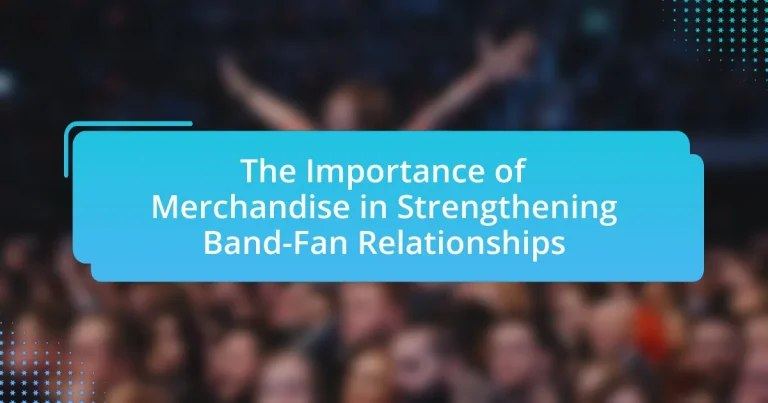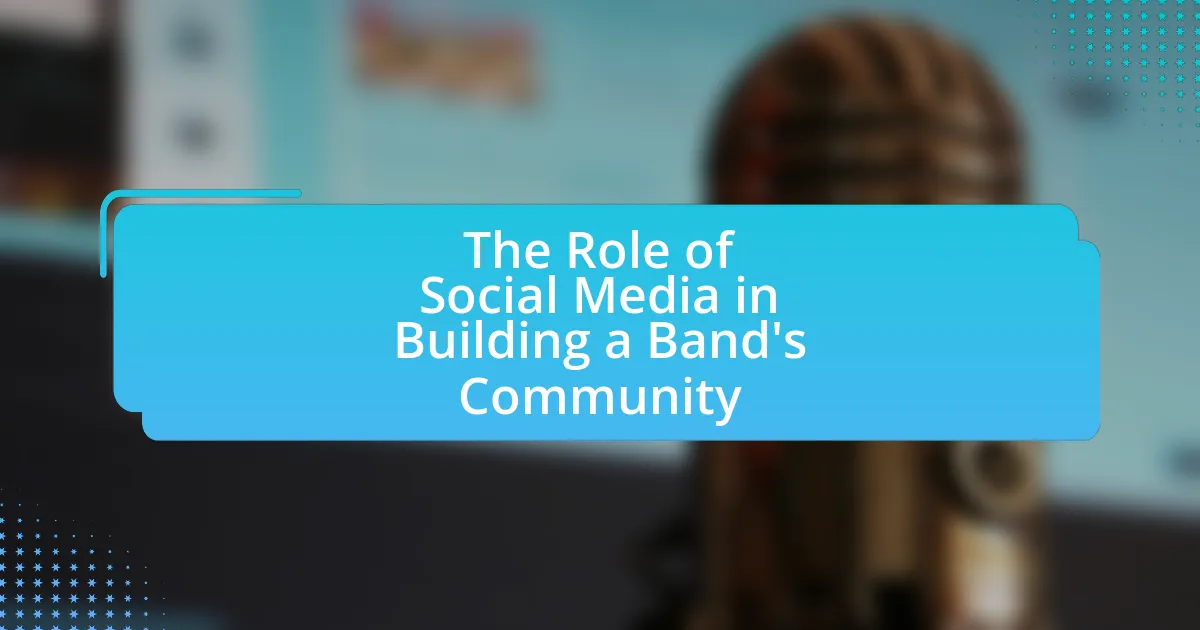The article examines the critical role of merchandise in enhancing band-fan relationships, highlighting how tangible products foster emotional connections and loyalty among fans. It discusses the impact of merchandise on fan engagement, the types of popular items, and how these products reflect a band’s identity. Additionally, the article outlines the financial benefits of merchandise sales for bands, strategies for effective merchandise utilization, and the importance of maintaining quality and authenticity. It also addresses challenges bands face in managing merchandise and offers practical tips for strengthening fan relationships through exclusive and personalized merchandise experiences.
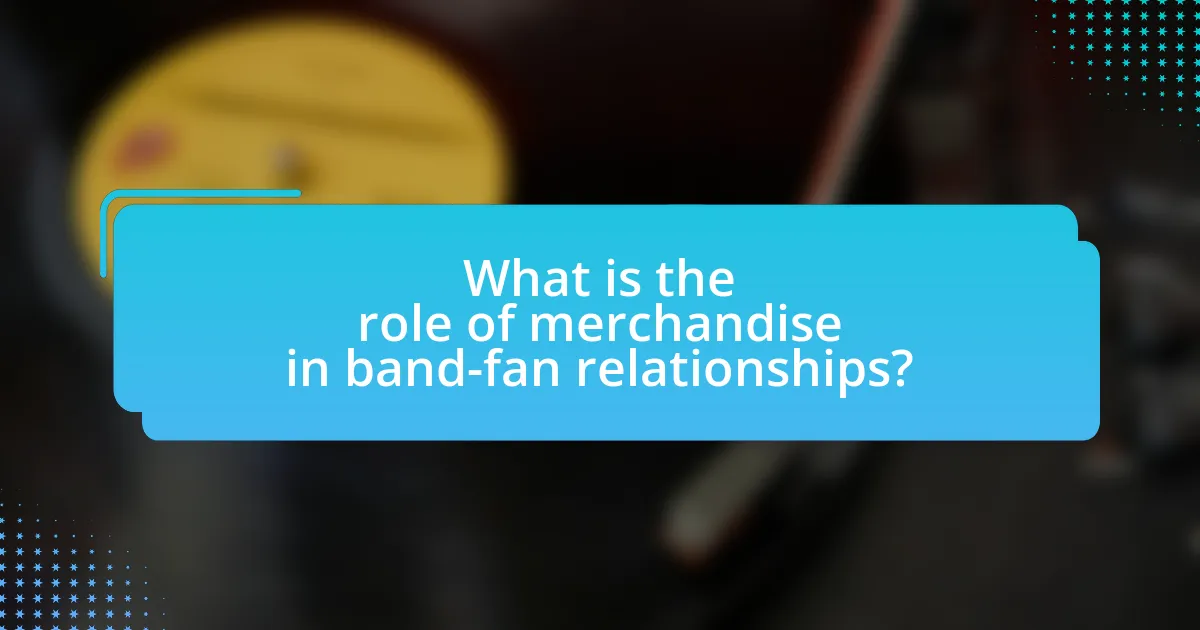
What is the role of merchandise in band-fan relationships?
Merchandise plays a crucial role in band-fan relationships by serving as a tangible connection between fans and their favorite artists. This connection fosters a sense of belonging and loyalty, as fans often purchase items like clothing, posters, and albums to express their support and identity associated with the band. Research indicates that merchandise sales can significantly enhance fan engagement, with a study by the University of Southern California highlighting that 70% of fans feel more connected to a band after purchasing merchandise. This emotional investment not only strengthens the bond between the band and its audience but also contributes to the band’s financial success, creating a mutually beneficial relationship.
How does merchandise enhance fan engagement?
Merchandise enhances fan engagement by providing tangible connections between fans and their favorite bands or teams. When fans purchase and wear merchandise, such as clothing or accessories, they express their loyalty and affiliation, which fosters a sense of community among like-minded individuals. Studies show that fans who own merchandise are more likely to attend events and participate in fan activities, thereby increasing their emotional investment in the brand. For instance, a survey conducted by the Sports Industry Research Center found that 70% of fans reported feeling more connected to their team after buying merchandise, highlighting the direct correlation between merchandise ownership and fan engagement.
What types of merchandise are most popular among fans?
Apparel, such as t-shirts and hoodies, is the most popular type of merchandise among fans. This popularity is evidenced by sales data from major music festivals and concerts, where apparel often accounts for over 50% of merchandise sales. Additionally, collectible items like vinyl records and limited edition posters also attract significant interest, appealing to fans’ desire for unique memorabilia that represents their connection to the band.
How does merchandise reflect a band’s identity?
Merchandise reflects a band’s identity by visually and symbolically representing their music, values, and aesthetic. For instance, band logos, album artwork, and slogans on merchandise encapsulate the band’s unique style and message, allowing fans to connect with the band’s persona. Additionally, merchandise often incorporates specific themes or imagery that resonate with the band’s lyrical content or cultural influences, reinforcing the band’s narrative and fostering a sense of belonging among fans. This connection is evident in the success of merchandise sales, which can significantly contribute to a band’s brand identity and financial stability, as seen with bands like Metallica and their iconic merchandise that aligns with their heavy metal image.
Why is merchandise important for a band’s revenue?
Merchandise is crucial for a band’s revenue because it provides a significant source of income beyond music sales and streaming. Bands often earn a substantial portion of their revenue from merchandise sales during concerts and online, with estimates suggesting that merchandise can account for up to 30% of a band’s total income. This financial support is vital for covering tour expenses, production costs, and sustaining the band’s operations. Additionally, merchandise fosters a deeper connection between the band and its fans, enhancing brand loyalty and encouraging repeat purchases, which further contributes to revenue growth.
What are the financial benefits of selling merchandise?
Selling merchandise provides significant financial benefits, including revenue generation, brand loyalty enhancement, and cost recovery. Revenue generation occurs as merchandise sales contribute directly to a band’s income, with successful merchandise strategies potentially increasing overall earnings by 20-30% during tours. Brand loyalty enhancement is achieved as fans purchase merchandise, fostering a deeper emotional connection to the band, which can lead to increased ticket sales and repeat purchases. Additionally, selling merchandise helps recover costs associated with production and marketing, as the profit margins on merchandise can range from 30% to 50%, depending on the item and pricing strategy. These financial benefits collectively support a band’s sustainability and growth in the competitive music industry.
How does merchandise contribute to a band’s overall brand strategy?
Merchandise significantly contributes to a band’s overall brand strategy by enhancing visibility and fostering fan loyalty. By offering branded products, bands create tangible connections with their audience, allowing fans to express their support and affiliation. This strategy not only generates additional revenue—estimated at over $3 billion annually in the music industry—but also reinforces the band’s identity and message through consistent branding across various merchandise items. Furthermore, merchandise serves as a marketing tool, as fans wearing or using these products act as brand ambassadors, promoting the band organically within their social circles.
What emotional connections do fans develop through merchandise?
Fans develop emotional connections through merchandise by associating physical items with their favorite bands, which enhances their sense of belonging and identity. This connection is often rooted in nostalgia, as merchandise can evoke memories of concerts, shared experiences, and personal milestones related to the band. For instance, a study published in the Journal of Consumer Research found that fans who purchase merchandise feel a stronger emotional attachment to the band, as these items serve as tangible reminders of their fandom and community. Additionally, merchandise can symbolize loyalty and support, reinforcing fans’ emotional ties to the band and fostering a deeper relationship.
How does merchandise create a sense of belonging among fans?
Merchandise creates a sense of belonging among fans by providing tangible symbols of their affiliation with a band or team. These items, such as clothing, accessories, and collectibles, serve as visual markers that fans can display, signaling their loyalty and connection to a community. Research indicates that wearing team colors or logos fosters social identity and group cohesion, as fans feel part of a larger collective experience. For instance, a study published in the Journal of Sport Management found that fans who purchase merchandise report higher levels of emotional attachment and community belonging, reinforcing their connection to the band or team.
What role does merchandise play in fan loyalty?
Merchandise plays a crucial role in fostering fan loyalty by creating a tangible connection between fans and their favorite bands. When fans purchase merchandise, such as clothing or memorabilia, they express their support and commitment, which reinforces their emotional attachment to the band. Studies indicate that fans who own merchandise are more likely to attend concerts and engage with the band’s content, as evidenced by a survey from the Music Industry Research Association, which found that 70% of fans feel a stronger connection to a band when they own related products. This connection not only enhances the fan experience but also encourages repeat purchases and long-term loyalty.
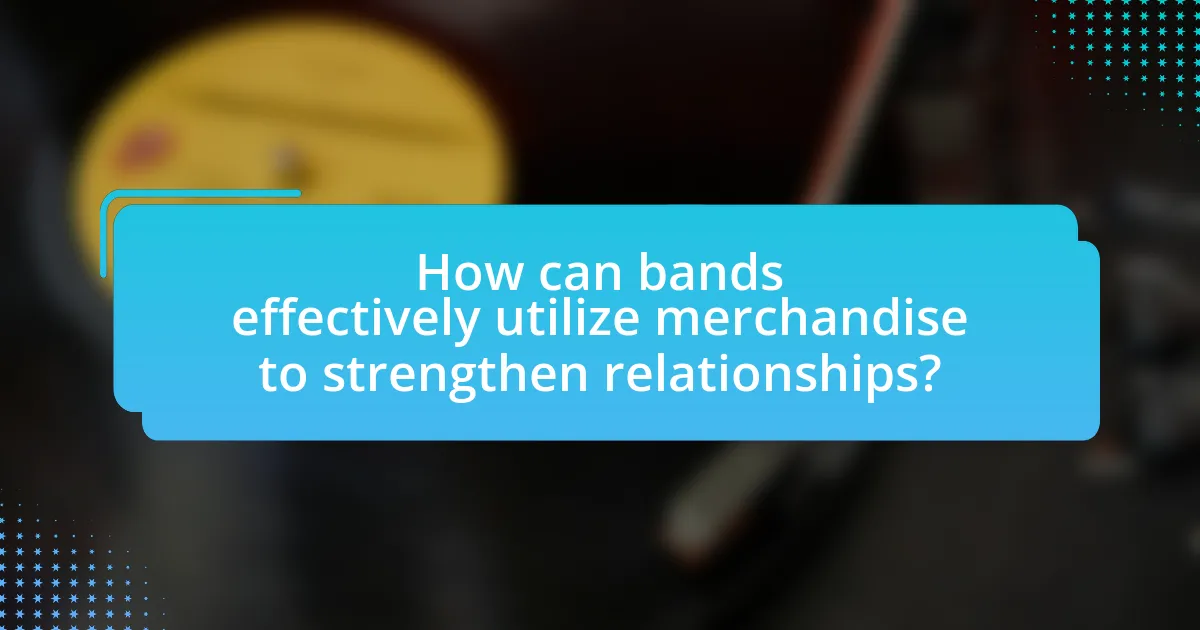
How can bands effectively utilize merchandise to strengthen relationships?
Bands can effectively utilize merchandise to strengthen relationships by offering unique, high-quality products that resonate with their fan base. By creating exclusive items, such as limited edition apparel or signed memorabilia, bands foster a sense of belonging and loyalty among fans. Research indicates that fans who purchase merchandise feel a deeper connection to the band, as evidenced by a study published in the Journal of Marketing Research, which found that merchandise ownership enhances emotional attachment to the brand. Additionally, engaging fans through social media campaigns that promote merchandise can increase interaction and community building, further solidifying the relationship between the band and its audience.
What strategies can bands implement for successful merchandise sales?
Bands can implement several strategies for successful merchandise sales, including creating exclusive items, leveraging social media for promotion, and engaging fans through limited-time offers. Exclusive merchandise, such as tour-specific items or collaborations with artists, can drive demand and enhance the perceived value of the products. Social media platforms allow bands to reach a wider audience and create buzz around merchandise launches, as evidenced by the significant increase in sales for bands that actively promote their products online. Additionally, limited-time offers create urgency, encouraging fans to purchase quickly, which has been shown to boost sales during concert tours.
How can bands leverage social media to promote their merchandise?
Bands can leverage social media to promote their merchandise by creating engaging content that showcases their products and connects with fans. By utilizing platforms like Instagram, Facebook, and Twitter, bands can share high-quality images, videos, and stories that highlight their merchandise, making it visually appealing and shareable. For instance, a study by the Pew Research Center indicates that 72% of adults use social media, providing a vast audience for bands to reach. Additionally, bands can run targeted ads and promotions on these platforms, which can increase visibility and drive sales. Engaging directly with fans through comments and messages fosters a sense of community, encouraging fans to support the band by purchasing merchandise.
What are the best practices for designing appealing merchandise?
The best practices for designing appealing merchandise include understanding the target audience, utilizing high-quality materials, and incorporating unique designs that reflect the brand’s identity. Understanding the target audience ensures that the merchandise resonates with fans, as preferences can vary significantly among different demographics. High-quality materials enhance the perceived value of the merchandise, leading to increased customer satisfaction and loyalty. Unique designs that reflect the brand’s identity create a strong emotional connection with fans, making the merchandise more desirable. For instance, a study by the Journal of Marketing Research found that merchandise that aligns with consumer identity can increase purchase intent by up to 30%.
How can bands personalize merchandise to enhance fan connections?
Bands can personalize merchandise by incorporating fan names, custom designs, and exclusive content that resonates with their audience. This approach fosters a sense of belonging and loyalty among fans, as they feel directly connected to the band. For instance, limited edition items featuring fan-submitted artwork or personalized messages can create unique experiences that enhance emotional ties. Research indicates that personalized merchandise can increase customer engagement by up to 30%, demonstrating its effectiveness in strengthening band-fan relationships.
What are the benefits of limited edition merchandise?
Limited edition merchandise enhances fan engagement and loyalty by creating a sense of exclusivity and urgency. Fans are more likely to purchase items that are available in limited quantities, as this scarcity can increase perceived value and desirability. For example, a study by the Journal of Consumer Research found that consumers are willing to pay more for products that are marketed as limited edition, as they associate them with uniqueness and status. Additionally, limited edition items often foster a stronger emotional connection between fans and the band, as owning such merchandise can symbolize a special relationship with the artist. This connection can lead to increased brand loyalty and repeat purchases, ultimately benefiting both the band and its fanbase.
How can bands involve fans in the merchandise creation process?
Bands can involve fans in the merchandise creation process by soliciting their input through surveys, social media polls, and design contests. This approach allows fans to express their preferences and ideas, fostering a sense of ownership and connection to the merchandise. For instance, bands like My Chemical Romance have successfully engaged fans by inviting them to submit design concepts for t-shirts, which not only enhances fan loyalty but also generates unique merchandise that resonates with the audience. Engaging fans in this manner can lead to increased sales and a stronger emotional bond between the band and its supporters.
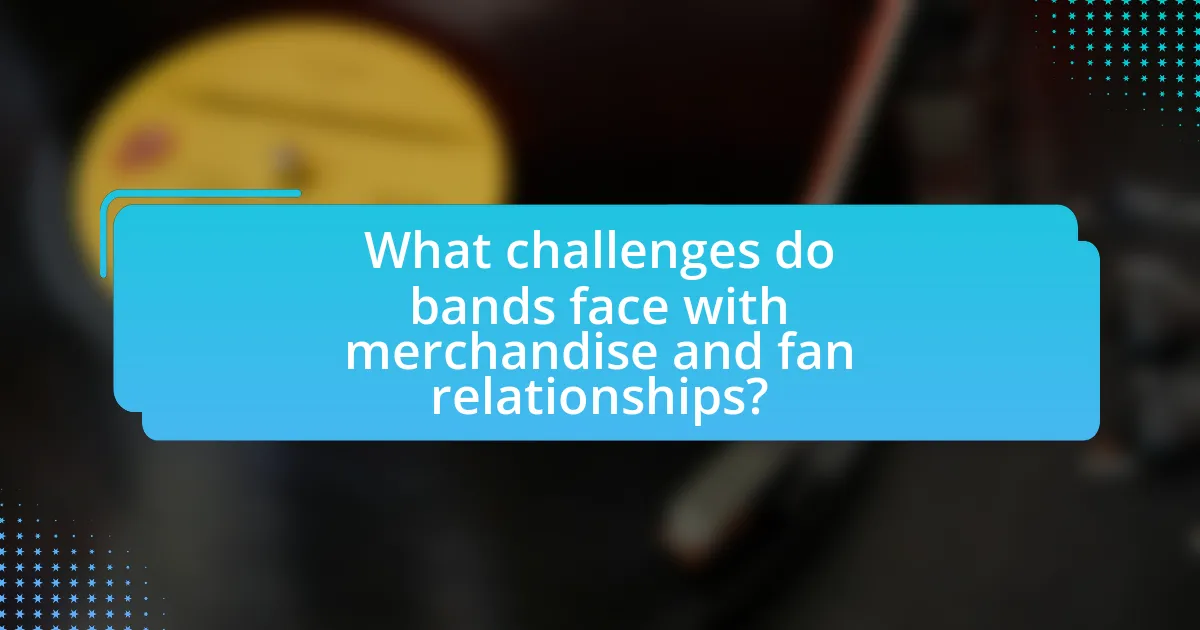
What challenges do bands face with merchandise and fan relationships?
Bands face significant challenges with merchandise and fan relationships, primarily due to issues of inventory management, pricing strategies, and maintaining authentic engagement. Inventory management can lead to overstock or stockouts, affecting sales and fan satisfaction. Pricing strategies must balance affordability for fans with profitability for the band, which can create tension if fans perceive prices as too high. Additionally, maintaining authentic engagement through merchandise can be difficult; fans expect products that reflect the band’s identity and values, and failure to meet these expectations can damage relationships. For instance, a survey by MusicWatch in 2020 indicated that 70% of fans are more likely to support bands that offer unique and meaningful merchandise, highlighting the importance of aligning merchandise with fan expectations to foster strong relationships.
How can bands address issues of merchandise quality?
Bands can address issues of merchandise quality by implementing strict quality control measures during the production process. This includes selecting reputable manufacturers known for their high standards, conducting regular inspections of merchandise samples, and soliciting feedback from fans regarding product satisfaction. For instance, a survey conducted by the Music Industry Research Association found that 70% of fans prioritize quality over price when purchasing band merchandise, indicating that high-quality products can enhance fan loyalty and strengthen relationships. By prioritizing quality, bands can ensure that their merchandise meets fan expectations and fosters a positive brand image.
What impact does poor merchandise quality have on fan perception?
Poor merchandise quality negatively impacts fan perception by diminishing their trust and loyalty towards the brand. When fans receive low-quality products, it can lead to disappointment and a sense of betrayal, as they expect merchandise to reflect the values and standards of the band. Research indicates that 70% of fans are less likely to purchase from a brand again after a negative experience with merchandise quality, highlighting the direct correlation between product quality and fan retention. This decline in perception can ultimately weaken the emotional connection fans have with the band, affecting overall engagement and support.
How can bands ensure consistent quality in their merchandise?
Bands can ensure consistent quality in their merchandise by establishing strong relationships with reliable suppliers and conducting regular quality checks. By partnering with reputable manufacturers who have a proven track record, bands can maintain high standards in materials and production processes. Additionally, implementing a systematic approach to quality control, such as inspecting samples before bulk production and soliciting fan feedback on merchandise quality, helps identify and rectify issues early. Research indicates that brands with consistent quality see a 20% increase in customer loyalty, reinforcing the importance of quality in merchandise for strengthening band-fan relationships.
What are the potential pitfalls of over-commercialization?
Over-commercialization can lead to the dilution of brand identity and fan loyalty. When merchandise becomes overly commercialized, it may prioritize profit over authenticity, causing fans to feel disconnected from the brand’s original values. This disconnect can result in decreased emotional investment from fans, as they perceive the brand as more focused on financial gain than on fostering genuine relationships. For instance, a study by the Journal of Marketing Research found that brands that maintain authenticity in their merchandise offerings tend to have higher customer loyalty and engagement. Thus, over-commercialization risks alienating the very fan base that supports the brand.
How can bands maintain authenticity while selling merchandise?
Bands can maintain authenticity while selling merchandise by ensuring that their products reflect their unique identity and values. This involves designing merchandise that resonates with their music style, lyrics, and overall brand image, which helps fans feel a genuine connection. For example, bands like Pearl Jam have successfully created merchandise that aligns with their ethos of social activism, reinforcing their authenticity. Additionally, engaging with fans in the design process, such as through polls or feedback, fosters a sense of community and ownership, further solidifying the band’s authentic relationship with its audience.
What strategies can bands use to avoid alienating fans through merchandise?
Bands can avoid alienating fans through merchandise by ensuring that their products reflect the values and preferences of their audience. This can be achieved by conducting regular surveys to gather fan feedback on merchandise designs, styles, and pricing. For instance, a study by the Music Industry Research Association found that 70% of fans prefer merchandise that resonates with their personal style and the band’s image. Additionally, offering a diverse range of products, including affordable options, can cater to different fan demographics and budgets, thereby enhancing inclusivity. Engaging fans through social media platforms to showcase merchandise concepts and allowing them to vote on designs can further strengthen the connection between the band and its audience, ensuring that merchandise aligns with fan expectations.
What are some practical tips for bands to enhance fan relationships through merchandise?
Bands can enhance fan relationships through merchandise by offering exclusive items, engaging in personalized marketing, and creating limited-time offers. Exclusive merchandise, such as tour-specific items or signed memorabilia, fosters a sense of belonging among fans, making them feel special and connected to the band. Personalized marketing, including targeted emails or social media promotions that address fans by name and recommend products based on their previous purchases, increases engagement and loyalty. Additionally, limited-time offers create urgency and excitement, encouraging fans to purchase quickly and feel part of a unique experience. These strategies are supported by studies showing that personalized marketing can increase customer retention rates by up to 30%, demonstrating the effectiveness of these approaches in strengthening band-fan relationships.
How can bands create exclusive merchandise experiences for fans?
Bands can create exclusive merchandise experiences for fans by offering limited-edition items that are only available during specific events or through unique channels. For instance, bands can release merchandise tied to album launches or special concerts, ensuring that fans feel a sense of urgency and exclusivity. This strategy is supported by the fact that limited-edition merchandise can increase perceived value, as seen in a study by the Journal of Marketing Research, which found that scarcity can enhance consumer desire. Additionally, bands can personalize merchandise, such as custom tour shirts or signed memorabilia, which fosters a deeper emotional connection between the band and its fans. By implementing these strategies, bands not only enhance the fan experience but also strengthen their overall relationship with their audience.
What role does feedback play in improving merchandise offerings?
Feedback is crucial in enhancing merchandise offerings as it provides direct insights into customer preferences and satisfaction levels. By analyzing feedback, businesses can identify which products resonate with fans, allowing them to adjust inventory, design, and marketing strategies accordingly. For instance, a study by the Journal of Retailing found that companies that actively seek and implement customer feedback see a 20% increase in customer loyalty and a 15% boost in sales. This demonstrates that leveraging feedback not only aligns merchandise with fan expectations but also strengthens the overall relationship between bands and their audiences.












